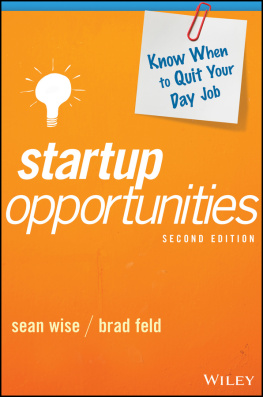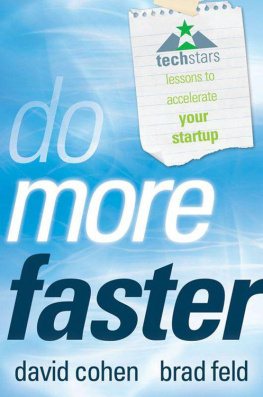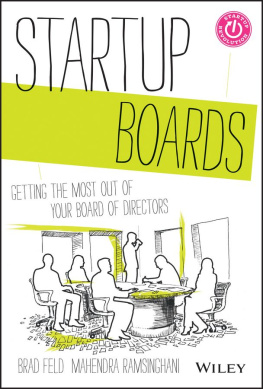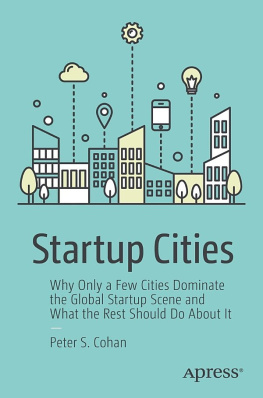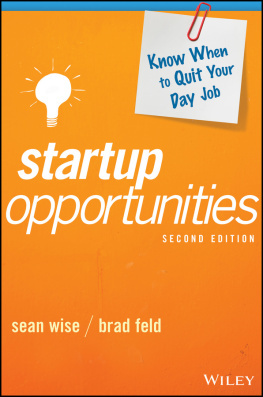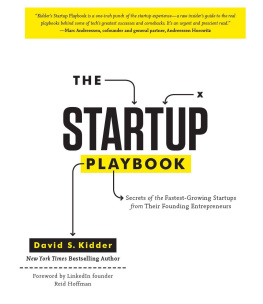Table of Contents
Guide
Pages
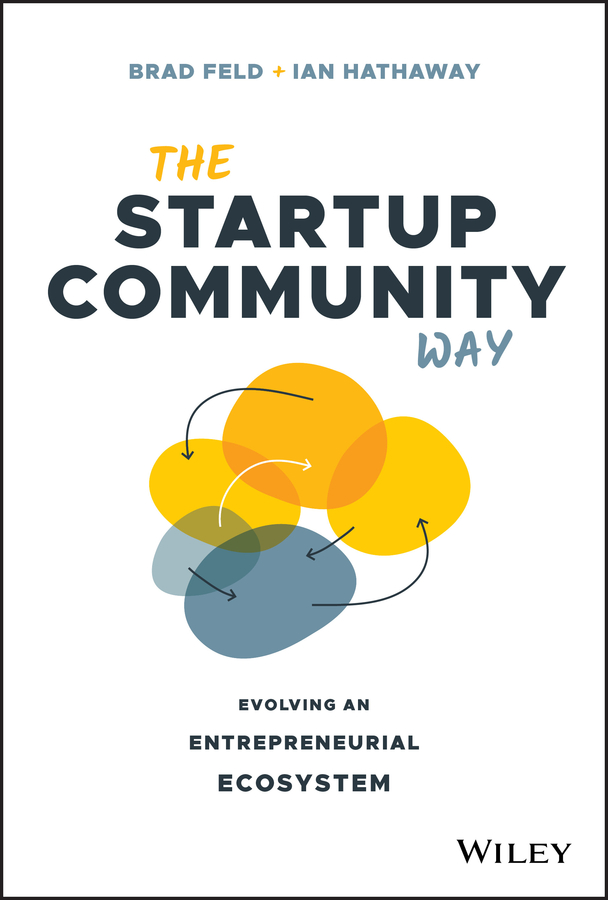
BRAD FELD AND IAN HATHWAY
THE STARTUP COMMUNITY WAY
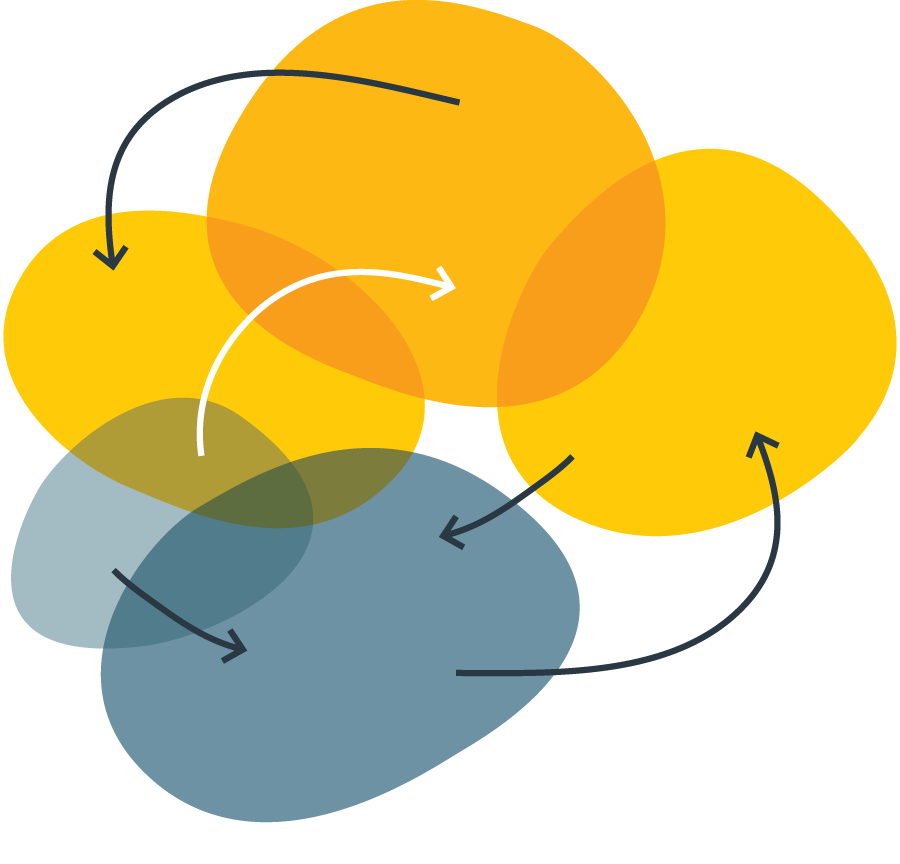
EVOLVING AN ENTEPRENEURIAL ECOSYSTEM

Copyright 2020 by Brad Feld and Ian Hathaway. All rights reserved.
Published by John Wiley & Sons, Inc., Hoboken, New Jersey.
Published simultaneously in Canada.
No part of this publication may be reproduced, stored in a retrieval system, or transmitted in any form or by any means, electronic, mechanical, photocopying, recording, scanning, or otherwise, except as permitted under Section 107 or 108 of the 1976 United States Copyright Act, without either the prior written permission of the Publisher, or authorization through payment of the appropriate per-copy fee to the Copyright Clearance Center, Inc., 222 Rosewood Drive, Danvers, MA 01923, (978) 7508400, fax (978) 6468600, or on the Web at www.copyright.com. Requests to the Publisher for permission should be addressed to the Permissions Department, John Wiley & Sons, Inc., 111 River Street, Hoboken, NJ 07030, (201) 7486011, fax (201) 7486008, or online at www.wiley.com/go/permissions.
Limit of Liability/Disclaimer of Warranty: While the publisher and author have used their best efforts in preparing this book, they make no representations or warranties with respect to the accuracy or completeness of the contents of this book and specifically disclaim any implied warranties of merchantability or fitness for a particular purpose. No warranty may be created or extended by sales representatives or written sales materials. The advice and strategies contained herein may not be suitable for your situation. You should consult with a professional where appropriate. Neither the publisher nor author shall be liable for any loss of profit or any other commercial damages, including but not limited to special, incidental, consequential, or other damages.
For general information on our other products and services or for technical support, please contact our Customer Care Department within the United States at (800) 7622974, outside the United States at (317) 5723993, or fax (317) 5724002.
Wiley publishes in a variety of print and electronic formats and by print-on-demand. Some material included with standard print versions of this book may not be included in e-books or in print-on-demand. If this book refers to media such as a CD or DVD that is not included in the version you purchased, you may download this material at http://booksupport.wiley.com. For more information about Wiley products, visit www.wiley.com.
Library of Congress Cataloging-in-Publication Data:
Names: Feld, Brad, author. | Hathaway, Ian, author.
Title: The startup community way : evolving an entrepreneurial ecosystem / Brad Feld and Ian Hathaway.
Description: Hoboken, New Jersey : John Wiley & Sons, Inc., [2020] | Series: Techstars | Includes index.
Identifiers: LCCN 2020013290 (print) | LCCN 2020013291 (ebook) | ISBN 9781119613602 (cloth) | ISBN 9781119613640 (adobe pdf) | ISBN 9781119613626 (epub)
Subjects: LCSH: Entrepreneurship. | New business enterprisesEnvironmental aspects. | CommunitiesSocial aspects.
Classification: LCC HB615 .F4524 2020 (print) | LCC HB615 (ebook) | DDC 338/.04dc23
LC record available at https://lccn.loc.gov/2020013290LC
ebook record available at https://lccn.loc.gov/2020013291
Cover Design: Wiley
For Amy, who tirelessly supports me in all my endeavors.
For Suzy, co-founder of my favorite startup.
FOREWORD
In 2020, startup communities, which once appeared on the landscape of business (as well as the literal landscape) like so many rare animals, are long past the point of being uncommon or even unusual. As you'll read in the many compelling stories of progress that follow, they're coming together everywhere now, both in this country and around the globe, filled with energy and potential and the desire to look ahead to the kind of future we all want for our society. This is a critically important development. Quite simply: We need entrepreneurs and their ideas to keep our society moving forward, not just economically but equitably. The nurturing of startups, which is amplified by magnitudes when they share in a community of organizations and people, is the best way to make sure we achieve that goal.
That startup communities exist in such abundance is thanks, in large part, to Brad Feld. Every startup is unique, unpredictable, and unstable, but that doesn't mean they can't be managed for success, provided it's the right kind of management. The same is true of every startup community. That's the subject of Brad's book, Startup Communities: Building an Entrepreneurial Ecosystem in Your City. It lays out clear practices and principles for managing the bottom-up (versus top-down) structure of startup communities, which, because they're built on networks of trust rather than layers of control, can't be maintained in the same way that public goods and economic development were in the past. Rather than a rigid, hierarchical set of rules and processes, they thrive on a responsive, flexible method of working that uses validated learning to make decisions with minimal error. Like entrepreneurs, startup community builders can't rely on hunches or assumptions; they need to get out there, gather data, and see what's happening for themselves. Only then can they bring together diverse, engaged organizations that draw on each other's energy and experience and are led by committed, long-termoriented entrepreneurs. By detailing a system that was hiding in plain sight, like so many methods used by entrepreneurs, Brad made it available to anyone worldwide who wants to bring innovation and growth to their city or town.
All of which is why, now that we've reached the next phase of startup community development, there's no one better than Brad to address its central issue: what happens (or doesn't) when startup communities co-exist with other, more traditionally hierarchical institutions that, as much as they'd like to work with their innovative neighbors, can't break free of their old rules and management styles? And how can we ensure that all of these players work together with respect for each other's strengths, and with clarity, to maximize their positive effect on the world around us? Brad's answer, once again, is to clearly lay out the methods and tools that can affect this change. He and his co-author, Ian Hathaway, have combined deep experience with rigorous, intensive research and analysis to create a framework for this necessary path forward.
Every entrepreneur continues to iterate on their original product, and Brad is no exception. This book, The Startup Community Way: Evolving an Entrepreneurial Ecosystem, isn't just a follow up to Startup Communities; it's a refinement of those initial ideasas well as an expansion of them. It encompasses the increasingly common and often complex relationships and interdependencies between startup communities and legacy institutions including universities and government (both local and federal) and corporations, culture, media, place, and finance. By situating startup communities within this larger system of networks, Brad and Ian shine light not only on the interconnectedness between them, but their connections to the larger community and society as a whole.


